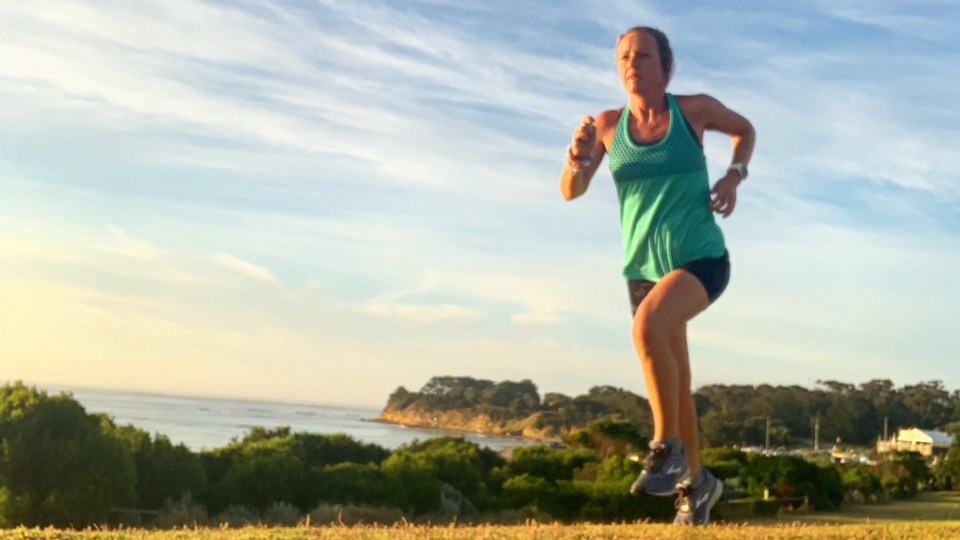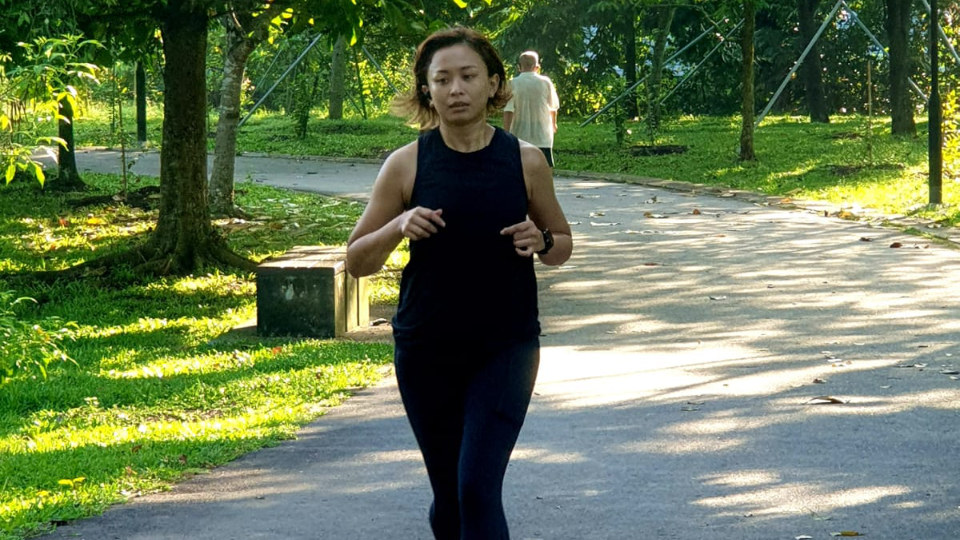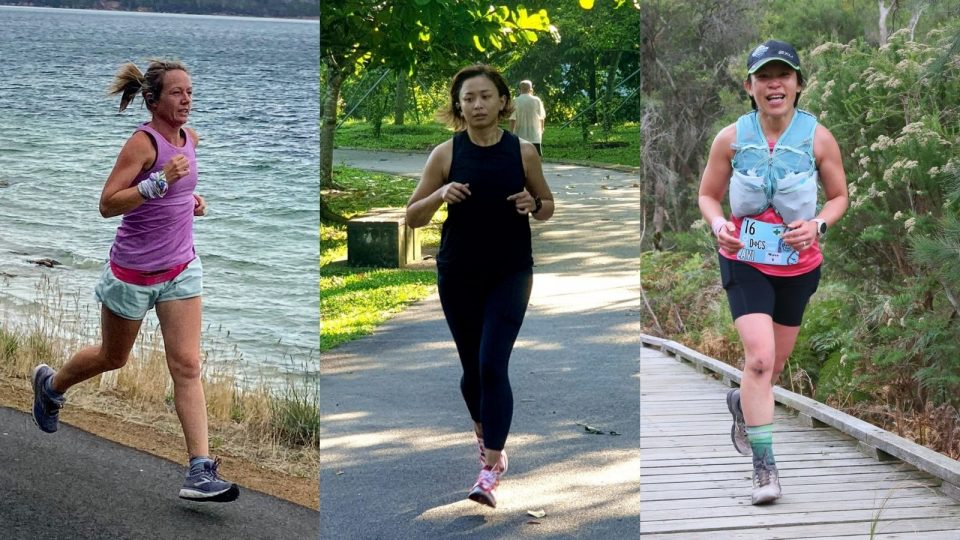Many people are curious about the keto diet and how keto and running work together. Basically, the keto diet is a way of eating high-fat, protein and low carb diet. It helps your body break down your macronutrients, which are carbs, protein and fat intake.
Your body will only consume 80 percent of fat and protein and almost zero intake from carbs. The foods to include for the keto diet are fish, meat, eggs, dairy, oils, and veggies. As for carbs, it is basically off-limits for you. It’s totally the opposite from a plant-based diet.
Now, you must be wondering, “Will it affect my running performance if I adopt the keto diet?” We spoke to three trained keto runners to share their experiences on how the Keto diet helps to improve their running performances.
1. Avi Charlton
Bio: Australian, 45-years old, Doctor, General Practitioner

Avi got into running 6 years ago to lose weight, get fit, and slowly, it became a hobby, an obsession and a social outlet.
Originally, she joined the gym to lose weight. After going to the gym three times a week for three months, she had not lost any weight. She took up running with a c25k run app and started park run.
After that, she lost 4kg and became addicted to running. Now, she runs four times a week and goes to the gym two times a week.
RS: How and why did you decide to become a Keto?
Avi: The gym that I go to had a body transformation competition. I signed up and was told what to eat. I started eating a low carb diet, following the gym instructor’s advice.
After that, I attended a low carb conference for doctors. The more I learnt, the more I read about the science, the more I learnt about the benefits of eating this way.
I learnt that carbohydrates turn into sugar when eaten. Excess carbs turn into fat by the hormone insulin and are stored as body fat.
High insulin causes weight gain and eventually insulin resistance, such as diabetes. I also learnt about endurance training from eating low carb or keto with being fat adapted.
This helps burn fat as fuel and ultimately not needing to constantly fuel with sugar gels. It is also a better fuel metabolically with less inflammation and less gastrointestinal side effects.
I now incorporate the low carb science into my work as a general practitioner. I teach patients to eat low carb to treat medical conditions, such as obesity and diabetes.
RS: What has benefited you the most from being a Keto?
Avi: Eating keto is awesome for weight control. My weight is now stable, and I don’t need to lose any more weight. It helps with my energy levels and I also feel more satiated. I am seldom hungry between meals and hardly need to snack.
I sleep better and feel more energy when exercising. By eating less sugar and refined carbs like bread, there is less inflammation and I feel my mind is clearer with higher productivity.
Injuries heal faster, and there’s less risk of aches and pains. I recover from long runs better.
RS: How can a ketogenic diet improve running performances?
Avi: : It may take up to 3 months for an athlete to be fat adapted. To do that, one must eat a low carb diet. Also, it is beneficial to train on an empty stomach. Performance is often affected before fat adaption happens.
So you might feel more tired and have less energy before this happens. However, once you are fat adapted, energy is often restored with endurance exercises.
There is less need to fuel during endurance exercises. The body can burn body fat stores rather than rely on glycogen stores from carbohydrate storage.
RS: What does your keto diet look like before, during and after the race?
Avi: I eat a very high protein diet. All of my meals are high in protein. For breakfast, most of the time, I eat two to three eggs. Sometimes, I add in some meat, like bacon and chorizo. If I am rushing out of the house, chia seed puddings with protein powder can be an easy option topped with yoghurt or smoothies with protein powder.
For lunch, it is usually a leftover meal from the night before. If I don’t have any leftovers, it can be a tin of fish like mackerel, sardines or tuna in olive oil, cheese, seed crackers and avocado.
For dinner, it’s usually meat and vegetables. Steak, lamb, pork, meatballs, chicken hamburgers (without the bun). There is no difference between a meal before a race or usual meal. I used to do the carb loading with pasta or rice before a long run or race.
But I am now fat adapted, so there is no need to do that. I still eat some carbs in the form of berries, small amounts of rice or sweet potatoes, beetroot and pumpkin.
During a long run or race, I make my own fuel. I pack them in squeeze pouches. I blend berries, chia seeds, lemon juice, MCT oil, sea salt, rice malt syrup and water together and freeze it the night before.
RS: Being a Keto runner, are there any long-term safety concerns with a ketogenic diet?
Avi: No, there are no safety concerns. Learning about science and the human body, there is no physiological requirement for the body to consume carbohydrates.
The body definitely needs protein and fat. In fact, the whole population should reduce their carbohydrate intake to reduce the incidence of obesity in the wider community.
You can follow Avi on Instagram: @doctor_mummy_runner
2. Anna McPhie
Bio: Australian, 41-years old, Entrepreneur

Anna began to run on the treadmill in her garage five years ago when her youngest child was 9 months old. She was instantly hooked and continued to set new running goals. Within six months, she ran her first half marathon.
Now five years later, she is about to run her 11th half marathon whilst she trains for her first full marathon, which is in October this year.
She has a running coach, who is Zac Newman at Run2PB, and he has been a huge support helping her come back from a couple of injuries and setbacks along the way.
RS: How and why did you decide to become a Keto?
Anna: : After having my second child, I wasn’t feeling mentally or physically well. I researched Keto and decided to give it a try.
My first half marathon, I ran using carbs as fuel but afterwards, I felt so sick and drained with gastro-like symptoms. Once I changed to using fat as my fuel, my running improved, I had more energy, and I had lost 24 kg in six months.
RS: What has benefited you the most from being a Keto?
Anna: Longer lasting energy, better skin, better moods, I am motivated, I sleep better and I don’t have carb crashes during the day.
RS: How can a ketogenic diet improve running performances?
Anna: It makes your energy systems more dynamic and efficient. With the good ability to burn fat as your primary food source, it allows you to run longer without needing to top up fuel because fat is so plentiful in the body if you can efficiently use it as a fuel source.
RS: What does your keto diet look like before, during and after the race?
In the week leading up to a race, I concentrate on protein, fibre and just clean foods, pretty much how I normally eat two days before the race. I add some carbohydrates, such as potatoes, to my meals to put glucose into the muscle, so it’s available if I need it in the race.
Before a race, I don’t generally eat anything other than a few nuts and a black coffee; however, I’ve adapted over time and fast most days until around lunchtime, so I believe it’s different for each individual.
For my fuel during the race, I make my own nut bars with nut butter and crushed nuts. In a half marathon, I find I only need to have some around the 12km mark, and that’s enough for me, along with water. After the race, I enjoy a black coffee and usually something like eggs, broccoli and avocado.
RS: Being a Keto runner, are there any long-term safety concerns with a ketogenic diet?
Anna: No. It’s eating clean, healthy food, cycling in carbs, together with fasting, and I feel better than I ever have. I am physically and mentally healthier than I have ever been. My current half marathon Pb is 1hr 43min, and it’s only getting better.
You can follow Anna on Instagram: @Eat.Run.Cook
3. Nordiana
Bio: Singaporean, 40-years old

In 2017, Nordiana decided to put additional effort into shedding some weight. She took up weekly running, as this is the only form of exercise that she can do fast.
She leaves her son at home and goes running in the wee hours of the morning and gets back home before her son wakes up.
Eventually, it became a habit to run on a daily basis, and she would feel ‘off’ now if she didn’t clock in at least a 2 to 5km run daily.
RS: How and why did you decide to become a Keto?
Nordiana: Because fitness is 20 percent exercise and 80 percent nutrition! I can’t ignore the fact and the chance upon the Keto diet. Studies have shown that our body (especially in old age) prefers using fat as a primary fuel instead of the usual carbs.
Being in my late 30s then and with lots of visible fat, I had to give it a shot. It was hard to keep the carb count low daily, but it was do-able, and I shed 5 kg with a strict Keto diet.
It was not until I learnt more about the different types of Keto diet (Standard Ketogenic Diet, Targeted Ketogenic Diet, Cyclical Ketogenic Diet and Restricted ketogenic Diet for Therapeutic Users) that I was finally able to maximize my weight or fat loss and running performance.
In my opinion, the best ketogenic diet for a runner would be Cyclical Ketogenic Diet (CKD) – also known as carb backloading, which involves days in which more carbs are eaten. For example, five ketogenic days followed by two higher carb days.
RS: What has benefited you the most from being a Keto?
Most of the benefits experienced was only after practising CKD (takes a while to adapt), not so much the Keto diet that we normally read.
The benefit reap mainly from the weight or fat loss. I shrunk visibly in clothes, shoes and even my ring size. I was ecstatic that I could fit into my wedding ring again; after 7 years not able to put it on! Also, I eat more variety of food now compared to before being on CKD.
As I became lighter, I was able to endure longer distance in races – the energy level and mental clarity that CKD brings makes it a crucial combination for races. Also, recovery after longer runs were cut short.
Before going on CKD, I would take around 2-3 days for recovery because when the diet consists of only carbs (inflammatory food), this slows down the recovery process. Now, just a day is sufficient for recovery (because of the lower amount of carbs consumed) even for long distance races.
RS: How can a ketogenic diet improve running performances? Why?
Nordiana: In the previous races, I started to experience cramps and energy dips after 10km and had to depend on taking sports gel due to drained energy levels. I went from energy dips to energy spikes, which was definitely not an enjoyable feeling.
With CKD, water and electrolytes were all that I needed, and the race could be completed free from cramps.
CKD can help with flexible metabolism. This means that the body will need relatively fewer carbs during the race week or the day before a race since the body develops an enhanced ability to conserve storage carbs (glycogen) and also an increased ability to utilize fat as a fuel both during and on race day.
RS: What does your keto diet look like before, during and after the race?
Nordiana: My last meal would be at least 3 hours before a race: a fat-nutrient-dense one. This meal includes eggs and ½ avocado. With this, I will also drink a keto supplement.
Before my race, I prepare a 1-liter sack with 2 teaspoons of a liquid electrolyte mix. That’s all I had during my marathon besides 1 liter of extra water. I would usually experience some stomach issues before and during the race, but this is rather normal.
After my race, the remainder of the day would usually be a carb refeed day. Why not, right? After depriving myself during my strict training period, I will want the feel of unhealthy foods (rather inflammatory).
My main choices are usually a huge packet of Lays BBQ chips, a plate of Penang Char Kway Teow or Nasi Goreng Kampung.
Basically, anything local! Usually, after that kind of a meal, I would feel really bloated. Eating those wrong types of food probably increased oxidative stress and dampened down my immune system.
Even though I know this, I still go back to those comfort foods. But it’s ok really, we are all human. I will get back to CKD the very next day.
RS: Being a Keto runner, are there any long-term safety concerns with a ketogenic diet?
Nordiana: It is important to determine which ketogenic diet one is taking up and do plenty of research. Being on very low carb percentages, a standard keto diet will not sustain heavy bouts of high-intensity exercise or voluminous training.
A standard keto diet can be difficult and uncomfortable for most and is not extremely practical from a social eating perspective. For CKD, one will be closer to 80 to 85% fat, 10-15% protein and 5-10% carbs, which is perfect for lasting health, longevity and weight/fat loss.
You can follow Nordiana on Instagram: @Dee Diana
Have you been on a keto diet before? Do share your keto and running experience with us and how it works for you. We would love to hear your thoughts!
What is a Keto Diet?
Basically, the keto diet is a way of eating high-fat, protein and low carb diet. It helps your body break down your macronutrients, which are carbs, protein and fat intake.
Your body will only consume 80 percent of fat and protein and almost zero intake from carbs. Your body utilises that back-up fuel, converting the fat you eat and body fat into ketones so you are burning fat for fuel.
Will it affect my running performance if I adopt the keto diet?
It may take up to 3 months for an athlete to be fat adapted. To do that, one must eat a low carb diet. Also, it is beneficial to train on an empty stomach. Performance is often affected before fat adaption happens.
Runners on a ketogenic diet actually experienced lower energy, slower running speed and a difficulty in performing high-intensity exercise. Those who may benefit are ultra distance runners.
Are there any long-term safety concerns with a ketogenic diet for runners?
It is important to determine which ketogenic diet one is taking up and do plenty of research. Being on very low carb percentages, a standard keto diet will not sustain heavy bouts of high-intensity exercise or voluminous training.
The keto diet could cause low blood pressure, kidney stones, constipation, nutrient deficiencies and an increased risk of heart disease. Experts recommend staying on keto for six months max before reintroducing more carbs to your diet.





